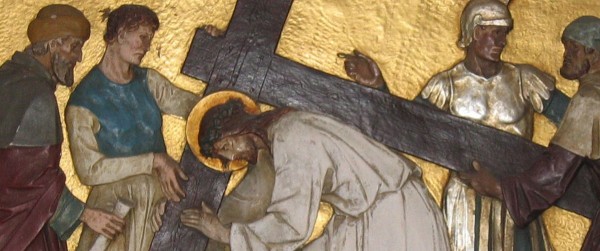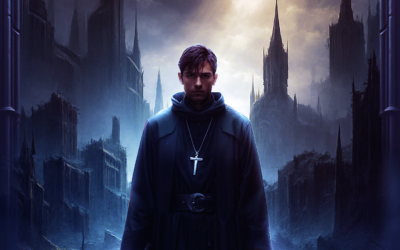Solus Christus. This means “In Christ Alone.” Only by Christ’s intervention. Only by the Coming-Between of Christ can we even hope for salvation. We cannot come on our own. We need that High Priest who has the right to come into the holy place, not by the blood of bulls, but by His own holy blood.
As are the other “Solas,” this stands in juxtaposition to the teachings of the Medieval Catholic Church.The belief then was that the Church (and in particular the new priesthood of the Pope and those under him) is the go-between for Man and God–the way that Moses was a go-between.
Protestant Christians believe otherwise. Christ opened the way for believers to directly enter into the holy of holies (thus the tearing of the curtain from top to bottom ). Christ is our Mediator.
He did not enter by means of the blood of goats and calves; but he entered the Most Holy Place once for all by his own blood, thus obtaining eternal redemption. Hebrews 9:12
For there is one God and one mediator between God and mankind, the man Christ Jesus, 1 Tim 2:5
What is it that Christ did? He took my place. His blood was shed for me.
1. I SINNED, and the consequence for that sin is swift, immediate DEATH.
Q-What is sin? A-Sin is any want of conformity unto or transgression of the Law of God. (WSC #14) In other words, sins of omission and sins of comission. Sins of forgetting to do right, and sins of doing wrong.
Jesus upped the ante by telling how detailed God is in viewing sin. If you even CONSIDER doing it, it’s sin.
For the wages of sin is death. (Rom 6:23)
2. JESUS TOOK MY PLACE.
He lived a righteous life. Knowing how detailed God is in judging even the motives and intentions of the heart, it is amazing to know he “was tempted in all ways, but without sin.” (Heb 4:15) He died for those “given to him” before the creation of the world. He was resurrected, opening up the way to God. (Rom 8:11 ) Wow!
3. FAITH IN THAT ACT…
Faith alone brings about what is called “vicarious atonement,” which means “the death He died He died for me.” And faith proves itself through works. (James 2:14) Anyone who believes that Christ died for them, cares to live in a way conformed to that life and death. The Holy Spirit living in us brings about the holy life God desires.
He has saved us and called us to a holy life—not because of anything we have done but because of his own purpose and grace. This grace was given us in Christ Jesus before the beginning of time, but it has now been revealed through the appearing of our Savior, Christ Jesus, who has destroyed death and has brought life and immortality to light through the gospel. (2 Tim 1:9-10)
In Christ alone my hope is found;
He is my light, my strength, my song;
This cornerstone, this solid ground,
Firm through the fiercest drought and storm.
What heights of love, what depths of peace,
When fears are stilled, when strivings cease!
My comforter, my all in all—
Here in the love of Christ I stand.
In Christ alone, Who took on flesh,
Fullness of God in helpless babe!
This gift of love and righteousness,
Scorned by the ones He came to save.
Till on that cross as Jesus died,
The wrath of God was satisfied;
For ev’ry sin on Him was laid—
Here in the death of Christ I live.
There in the ground His body lay,
Light of the world by darkness slain;
Then bursting forth in glorious day,
Up from the grave He rose again!
And as He stands in victory,
Sin’s curse has lost its grip on me;
For I am His and He is mine—
Bought with the precious blood of Christ.
No guilt in life, no fear in death—
This is the pow’r of Christ in me;
From life’s first cry to final breath,
Jesus commands my destiny.
No pow’r of hell, no scheme of man,
Can ever pluck me from His hand;
Till He returns or calls me home—
Here in the pow’r of Christ I’ll stand.
“In Christ Alone”
Words and Music by Keith Getty & Stuart Townend
Copyright © 2001 Kingsway Thankyou Music
IN THE BOOK: TRUNK OF SCROLLS
Marcellus and Byziana want to “please God.” Byziana soon comes to the dead end that “I cannot please Him,” and she acts accordingly. Marcellus, meanwhile, struggles with the big question of “How do I live a consecrated life?” He sees monks living on pillars, he sees vicious theological struggles between leaders of the church, he reads the Scrolls but sees the Church teaching things that do not match the simplicity of Scripture. The book is a story of Marcellus and Byziana both learning what it means that Christ was our Mediator. Why was it that he had to come to earth as man?


